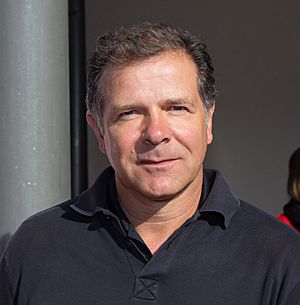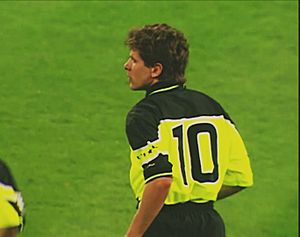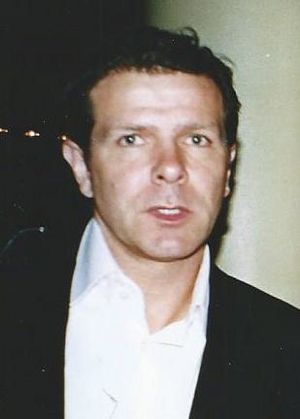Andreas Möller facts for kids

Möller in 2018
|
|||||||||||||||||||||||||
| Personal information | |||||||||||||||||||||||||
|---|---|---|---|---|---|---|---|---|---|---|---|---|---|---|---|---|---|---|---|---|---|---|---|---|---|
| Date of birth | 2 September 1967 | ||||||||||||||||||||||||
| Place of birth | Frankfurt, West Germany | ||||||||||||||||||||||||
| Height | 1.80 m (5 ft 11 in) | ||||||||||||||||||||||||
| Position(s) | Attacking midfielder | ||||||||||||||||||||||||
| Team information | |||||||||||||||||||||||||
|
Current team
|
Eintracht Frankfurt (head of youth) | ||||||||||||||||||||||||
| Youth career | |||||||||||||||||||||||||
| 1973–1981 | BSC Schwarz-Weiß 1919 Frankfurt | ||||||||||||||||||||||||
| 1981–1985 | Eintracht Frankfurt | ||||||||||||||||||||||||
| Senior career* | |||||||||||||||||||||||||
| Years | Team | Apps | (Gls) | ||||||||||||||||||||||
| 1985–1987 | Eintracht Frankfurt | 35 | (5) | ||||||||||||||||||||||
| 1988–1990 | Borussia Dortmund | 75 | (24) | ||||||||||||||||||||||
| 1990–1992 | Eintracht Frankfurt | 69 | (28) | ||||||||||||||||||||||
| 1992–1994 | Juventus | 56 | (19) | ||||||||||||||||||||||
| 1994–2000 | Borussia Dortmund | 153 | (47) | ||||||||||||||||||||||
| 2000–2003 | Schalke 04 | 86 | (6) | ||||||||||||||||||||||
| 2003–2004 | Eintracht Frankfurt | 11 | (0) | ||||||||||||||||||||||
| Total | 485 | (129) | |||||||||||||||||||||||
| International career | |||||||||||||||||||||||||
| 1988–1990 | West Germany U-21 | 4 | (2) | ||||||||||||||||||||||
| 1988–1999 | Germany | 85 | (29) | ||||||||||||||||||||||
| Managerial career | |||||||||||||||||||||||||
| 2007–2008 | Viktoria Aschaffenburg | ||||||||||||||||||||||||
| 2015–2017 | Hungary (assistant) | ||||||||||||||||||||||||
|
Medal record
|
|||||||||||||||||||||||||
| *Club domestic league appearances and goals | |||||||||||||||||||||||||
Andreas Möller (born 2 September 1967) is a German former professional footballer. He played as an attacking midfielder. Today, he is the head of the youth department at Eintracht Frankfurt.
From 1985 to 2004, Möller played in 429 Bundesliga games. He played for Eintracht Frankfurt, Borussia Dortmund, and FC Schalke 04. He was the first player in the Bundesliga to score 100 goals and make 100 assists. Möller also played for Juventus FC in Italy. He was part of the German national team that won the 1990 FIFA World Cup and UEFA Euro 1996. He also won the UEFA Champions League, UEFA Cup, and several German championships and cups with his clubs.
Contents
Andreas Möller's Early Life
Möller was born in Nordend, Frankfurt. He grew up in Sossenheim as an only child. His father worked in a warehouse, and his mother was a bank clerk.
His first football club was BSC Schwarz-Weiß 1919 Frankfurt. His father was a youth coach there. Klaus Gerster was his coach and later became a close friend and advisor.
Andreas Möller's Club Career Highlights
Möller played for several big clubs during his career. These included Eintracht Frankfurt, Borussia Dortmund, Juventus, and Schalke 04.
Starting at Eintracht Frankfurt
Möller joined Eintracht Frankfurt in 1981. In 1985, he won the German A-Youth Championship. He then joined the main team. His first game in the Bundesliga was on 26 April 1986. He scored his first professional goal from a penalty kick. By the 1987–88 season, he became a key player. He was known for his great dribbling skills.
First Time with Borussia Dortmund
On 17 February 1988, Möller started playing for Borussia Dortmund. He scored in his first game. In the 1988–89 DFB Cup, his team reached the final. They won 4–1 against SV Werder Bremen. This was his first national title. He also won the DFL-Supercup with Dortmund. He scored the winning goal in the final against Bayern Munich.
Return to Eintracht Frankfurt and Move to Juventus
Möller returned to Frankfurt in 1990. He scored 16 goals in the Bundesliga that year. This was his personal best. In the 1991–92 season, Frankfurt almost won the league title.
In 1992, Möller moved to Juventus in Italy. He won the UEFA Cup in 1993. Juventus beat his old club, Borussia Dortmund, 6–1 overall. Möller scored one goal and helped with three others in the final.
Second Time with Borussia Dortmund
Möller came back to Borussia Dortmund in 1994. He won many titles with the club. They won the Bundesliga in 1995 and 1996. He was a great playmaker and scorer. He was one of the best midfielders at that time.
His biggest success was winning the Champions League in 1997. Dortmund beat Juventus 3–1 in the final. Möller gave two assists in that match. Later that year, he won the Intercontinental Cup. He was named Man of the Match.
During this time, Möller was involved in a controversial moment. In a game in 1995, he pretended to be fouled to get a penalty. This is called a "dive" in football. Dortmund scored from the penalty and won the game. Möller was banned for two games and fined. He was the first player banned by the DFB for diving.
Playing for Schalke 04
In 2000, Möller joined Schalke 04, a rival of Dortmund. He quickly became a regular player. Schalke finished second in the Bundesliga in 2001. They also won the DFB-Pokal. The next season, Schalke won the DFB-Pokal again. Möller scored a goal in the final.
Final Years at Eintracht Frankfurt
For the 2003–04 season, Möller returned to Eintracht Frankfurt. The club had just been promoted to the Bundesliga. However, Möller played only eleven games. He could not help the team avoid being relegated. He played his last professional game on 28 February 2004. He announced his retirement from football three days later.
Andreas Möller's International Career
Möller played 85 times for the German national team. He scored 29 goals between 1988 and 1999. He played in five major international tournaments.
He won the 1990 World Cup and Euro 96. He also played in Euro 92, where Germany reached the final. He was part of the teams for the 1994 and 1998 World Cups. In the Euro 96 semi-final against England, Möller scored the winning penalty in the shoot-out. He celebrated in a memorable way.
Andreas Möller's Style of Play
Möller was a very talented and versatile advanced playmaker. He was known for his amazing sprinting speed. His nickname was "Turbo Möller." He could run 100 meters in 11.2 seconds. He had great passing skills, creativity, and vision. He was also very intelligent and quick with his decisions.
He was good at carrying the ball forward and running at defenders. Besides creating chances for teammates, he also scored many goals. He could shoot powerfully and accurately with both feet. He was also good at heading the ball. Sometimes, he played as a supporting striker or winger. He was also a free kick specialist.
Andreas Möller After Retirement
After he stopped playing, Möller became a football teacher. In 2007, he started coaching at Viktoria Aschaffenburg. From 2008 to 2011, he was the athletic director for Kickers Offenbach.
In 2015, Möller became an assistant coach for the Hungary national team. He worked with Bernd Storck.
On 5 October 2019, Möller returned to Eintracht Frankfurt. He was hired as the head of the youth department. He left this role on 31 March 2022 to spend more time with his family.
Andreas Möller's Personal Life
Möller married his first wife in 1992. They had three daughters. After they divorced in 2003, he married another woman in 2007.
Andreas Möller Outside of Football
Möller is on the board of a youth football foundation. This foundation was started in 2000 by Jürgen Klinsmann and other players.
During the 2006 FIFA World Cup, he commented on German national team games for AIDA Cruises guests.
Möller is famous for a funny quote. In 1992, when asked where he would play, he supposedly said: "Milan or Madrid, the main thing is Italy." He has said he doesn't remember saying it.
He was voted into the BVB Centenary Eleven by fans. He also sometimes worked as a co-commentator for football games on TV.
Andreas Möller in Media
Möller has been featured in EA Sports' FIFA video game series. He was on the cover of the German edition of FIFA 98.
Andreas Möller's Honours
Eintracht Frankfurt
- German A youth champion: 1985
Borussia Dortmund
- Bundesliga: 1994–95, 1995–96
- DFB-Pokal: 1988–89
- DFB-Supercup: 1989, 1995, 1996
- UEFA Champions League: 1996–97
- Intercontinental Cup: 1997
Juventus
- UEFA Cup: 1992–93
Schalke 04
- DFB-Pokal: 2000–01, 2001–02
Germany
- FIFA World Cup: 1990
- UEFA European Championship: 1996; runner-up: 1992
- U.S. Cup: 1993
Individual Awards
- kicker Bundesliga Team of the Season: 1988–89, 1989–90, 1990–91, 1991–92, 1995–96, 2000–01
- Bundesliga top assist provider: 1989–90, 1995–96
- kicker Bundesliga-best offensive midfielder: 1990, 1991
- Intercontinental Cup MVP of the Match Award: 1997
See also
 In Spanish: Andreas Möller para niños
In Spanish: Andreas Möller para niños



